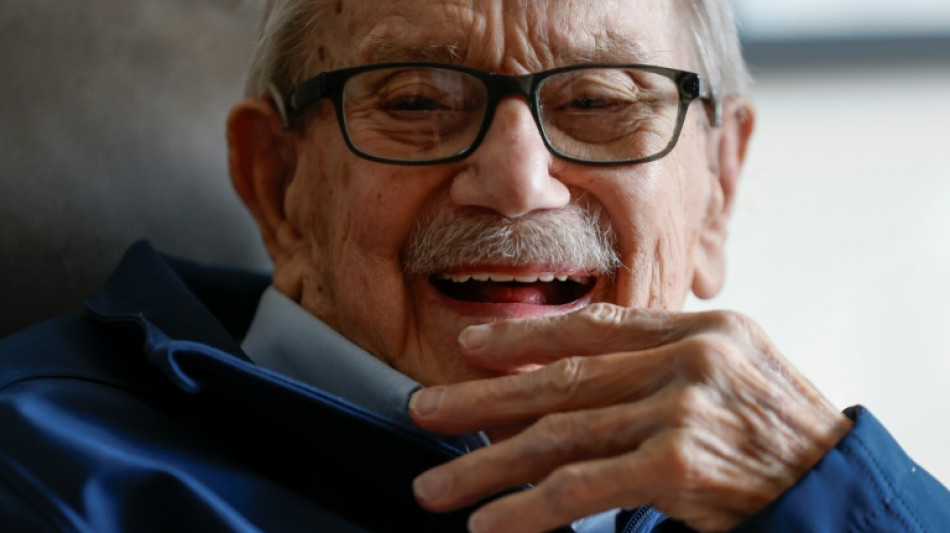
-
 England captain Stokes suffers facial injury after being hit by ball
England captain Stokes suffers facial injury after being hit by ball
-
Italy captain Lamaro amongst trio set for 50th caps against Scotland

-
 Piastri plays down McLaren rivalry with champion Norris
Piastri plays down McLaren rivalry with champion Norris
-
ECB holds interest rates as strong euro causes jitters

-
 Spain, Portugal face floods and chaos after deadly new storm
Spain, Portugal face floods and chaos after deadly new storm
-
EU close to sealing trade deal with Australia

-
 German Cup final to stay in Berlin until 2030
German Cup final to stay in Berlin until 2030
-
What does Iran want from talks with the US?

-
 Taming the lion: Olympians take on Bormio's terrifying Stelvio piste
Taming the lion: Olympians take on Bormio's terrifying Stelvio piste
-
Wind turbine maker Vestas sees record revenue in 2025

-
 Italy's Casse tops second Olympic downhill training
Italy's Casse tops second Olympic downhill training
-
Anti-doping boss 'uncomfortable' with Valieva's coach at Olympics

-
 Bitcoin under $70,000 for first time since Trump's election
Bitcoin under $70,000 for first time since Trump's election
-
'I am sorry,' embattled UK PM tells Epstein victims

-
 England's Brook predicts record 300-plus scores at T20 World Cup
England's Brook predicts record 300-plus scores at T20 World Cup
-
Ukraine, Russia swap prisoners, US says 'work remains' to end war

-
 Wales' Rees-Zammit at full-back for Six Nations return against England
Wales' Rees-Zammit at full-back for Six Nations return against England
-
Sad horses and Draco Malfoy: China's unexpected Lunar New Year trends

-
 Hong Kong students dissolve pro-democracy group under 'severe' pressure
Hong Kong students dissolve pro-democracy group under 'severe' pressure
-
Germany claws back 59 mn euros from Amazon over price controls

-
 Germany claws back 70 mn euros from Amazon over price controls
Germany claws back 70 mn euros from Amazon over price controls
-
VW and Stellantis urge help to keep carmaking in Europe

-
 Stock markets drop amid tech concerns before rate calls
Stock markets drop amid tech concerns before rate calls
-
BBVA posts record profit after failed Sabadell takeover

-
 UN human rights agency in 'survival mode': chief
UN human rights agency in 'survival mode': chief
-
Greenpeace slams fossil fuel sponsors for Winter Olympics

-
 Greenpeace slams fossel fuel sponsors for Winter Olympics
Greenpeace slams fossel fuel sponsors for Winter Olympics
-
Kinghorn, Van der Merwe dropped by Scotland for Six Nations opener

-
 Russia says thwarted smuggling of giant meteorite to UK
Russia says thwarted smuggling of giant meteorite to UK
-
Salt war heats up in ice-glazed Berlin

-
 Liverpool in 'good place' for years to come, says Slot
Liverpool in 'good place' for years to come, says Slot
-
Heathrow still Europe's busiest airport, but Istanbul gaining fast

-
 Highest storm alert lifted in Spain, one woman missing
Highest storm alert lifted in Spain, one woman missing
-
Shell profits climb despite falling oil prices

-
 Pakistan will seek govt nod in potential India T20 finals clash
Pakistan will seek govt nod in potential India T20 finals clash
-
China shuns calls to enter nuclear talks after US-Russia treaty lapses

-
 German factory orders rise at fastest rate in 2 years in December
German factory orders rise at fastest rate in 2 years in December
-
Nigeria president deploys army after new massacre

-
 Ukraine, Russia, US start second day of war talks
Ukraine, Russia, US start second day of war talks
-
Nepal's youth lead the charge in the upcoming election

-
 Sony hikes forecasts even as PlayStation falters
Sony hikes forecasts even as PlayStation falters
-
Rijksmuseum puts the spotlight on Roman poet's epic

-
 Trump fuels EU push to cut cord with US tech
Trump fuels EU push to cut cord with US tech
-
Fearless talent: Five young players to watch at the T20 World Cup

-
 India favourites as T20 World Cup to begin after chaotic build-up
India favourites as T20 World Cup to begin after chaotic build-up
-
Voter swings raise midterm alarm bells for Trump's Republicans

-
 Australia dodges call for arrest of visiting Israel president
Australia dodges call for arrest of visiting Israel president
-
Countries using internet blackouts to boost censorship: Proton

-
 Top US news anchor pleads with kidnappers for mom's life
Top US news anchor pleads with kidnappers for mom's life
-
Thailand's pilot PM on course to keep top job

| CMSC | -0.6% | 23.52 | $ | |
| GSK | 2.35% | 58.62 | $ | |
| RIO | -2.83% | 93.83 | $ | |
| BCC | -0.36% | 89.915 | $ | |
| BCE | -3.54% | 25.43 | $ | |
| NGG | -1.4% | 86.61 | $ | |
| JRI | 1.09% | 13.29 | $ | |
| RBGPF | 5.11% | 86.52 | $ | |
| AZN | 1.16% | 189.85 | $ | |
| BTI | 0.1% | 61.705 | $ | |
| RELX | 3.87% | 30.98 | $ | |
| VOD | -6.56% | 14.743 | $ | |
| BP | -2.34% | 38.3 | $ | |
| RYCEF | -1.87% | 16.62 | $ | |
| SCS | 0.12% | 16.14 | $ | |
| CMSD | -0.13% | 23.869 | $ |

For US veteran, D-Day memories still vivid after 80 years
Richard Rung recalls it vividly: German artillery firing on his landing craft, the sound of machine gun bullets striking the vessel, blood mixed with seawater on the deck, troops crying on the beach.
It has been nearly eight decades since Rung landed in France on D-Day -- June 6, 1944 -- as a 19-year-old US Navy sailor, part of a massive amphibious invasion that broke through German coastal defenses in a key victory for Allied forces.
He now lives in a suburb of Chicago with Dorothy, his wife of 75 years, but his memories of the violence and death he witnessed half a world away are still clear, and that distant day can still feel close at hand.
"D-Day is not always, you know, a long way off," said Rung, a gray-haired, mustachioed 99-year-old wearing a blue jacket with the US Navy emblem.
"Sometimes, it's yesterday," he said. "When you have these experiences, they come back to you if you get a right situation."
- 'They opened up' -
Rung's path to Normandy began when he was drafted in 1943, choosing the Navy on the advice of his father, who urged him to "take the Navy. At least you'll be at sea, you have something to eat."
He dreamed of serving on a destroyer, but was assigned to maintain the engine on a landing craft because of his knowledge of motors gained in vocational school -- a turn of events that brought him to France.
Rung trained in the United States and then traveled by ship to Britain, where he witnessed German planes bombing London.
"Every night, they were raided," he said.
After crossing the English Channel, Rung's landing craft hit Omaha Beach as part of the second wave on D-Day, coming under heavy German artillery and machine gun fire.
"We dropped the ramp at 7:30... and they opened up on us," he said.
- 'Get down!' -
Despite the danger, he tried to see what was unfolding -- to his skipper's chagrin.
"He looked down and he said, 'Dick, get down!' I wanted to see," said Rung, who remembered hearing bullets hitting the side of the landing craft as he looked at the beach.
"The machine guns were terrible," he said. "I'll never forget the machine guns."
The ship's log -- copied in Rung's diary -- provides a clipped, military account of the landing.
"0730 Hit beach. It being well guarded received two shells from 88mm. One in starboard locker, one in skipper's quarters, one 47mm hole in starboard bulwark. Two soldiers killed two badly hurt. One 47mm through port ramp extension."
Four minutes later, the landing craft pulled back and went in search of a better site, but other spots were also heavily guarded.
Finding a location and unloading the vessel took hours, but that mission had to be completed before the wounded could be taken to a hospital ship.
- 'It was terrible' -
Rung said the landing craft's deck was "flowing in blood" from troops who were hit mixed with seawater that entered when the ramp was lowered, which crew members had to clean off later in the day.
He also recalled seeing the bodies of fallen troops and "guys... crying on the beach. It was terrible."
The landing craft carried a bulldozer for mine-clearing, but "he never made it," Rung said. "He got to the beach -- I found this out the next morning -- he hit a mine."
"If they didn't get hit with a rifle, (they) could easily step on a mine," he said.
Two days after D-Day, Rung made a gruesome discovery while ashore.
"That's when I found this big pile of arms and legs," he said, wondering how it would be possible to identify someone from those remains.
- 'Peace, not war' -
After more than two months in Normandy, Rung was sent to the Pacific, and was at Leyte Harbor in the Philippines when Japan formally surrendered on September 2, 1945.
"Nobody can imagine what a great feeling it gave us to see and know that the war was over and that the thing we have been fighting so long and hard for had finally come to pass," he wrote in his diary.
Rung was honorably discharged from the Navy in 1946, going to college with funding from the GI Bill and later teaching history and political science as a professor.
He initially "didn't say much" about his World War II experiences, thinking that might be better, but "that's a mistake," he said.
"A guy that says, 'I don't want to talk about it' -- he needs to talk about it."
Rung still sometimes speaks to high school students, urging them to "work for peace, not war."
"I want them to be conscious of the fact that being a peacemaker is the way to go," he said.
J.AbuHassan--SF-PST




